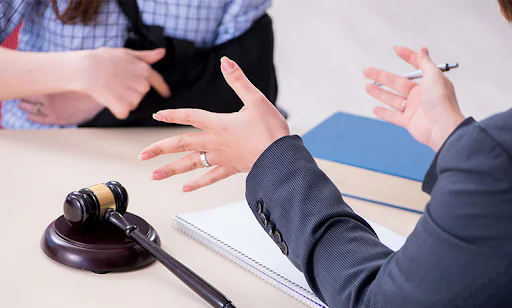Imagine you’re driving home after a long day of work. Suddenly, another driver runs a red light and crashes into your car. The impact leaves you shaken and injured, while your vehicle is severely damaged. In moments like these, determining liability becomes crucial to ensure that the responsible party takes accountability for their actions.
The Importance and Implications of Establishing Liability
Impact on Compensation
Proving liability is vital for victims to receive appropriate compensation for their injuries, medical expenses, property damage, lost wages, and pain and suffering resulting from the accident. Without establishing liability, securing adequate compensation becomes more challenging.
Legal Consequences
From a legal standpoint, the at-fault party may face consequences if found liable for the accident. These consequences can include fines, license suspension or revocation, and even criminal charges in certain cases. Additionally, establishing fault can affect insurance premiums and driving records. The at-fault driver may experience an increase in insurance rates or could potentially have their policy canceled.
Gathering Evidence to Prove Liability
Immediate Actions After the Accident
In the aftermath of a car accident, there are several crucial actions that individuals involved should prioritize:
- Call the police: Reporting the incident ensures that law enforcement creates an official record of what occurred.
- Obtain an accident report: The police report contains vital information about the accident’s circumstances and provides valuable evidence when determining liability.
- Seek medical attention: Even if injuries seem minor initially or not immediately apparent after an accident, it is crucial to seek a thorough medical evaluation as soon as possible.
- Document the scene: If physically able and it is safe to do so, take photographs or videos of the scene—including vehicle positions, road conditions (skid marks), traffic signs/signals present—before vehicles are moved.
Types of Evidence
Evidence plays a critical role in proving liability by substantiating claims made by victims. In a car accident involving a pedestrian, a dedicated Houston pedestrian accident lawyer will have to produce the following types of evidence to prove their case:
- Accident Reports: Official reports compiled by responding officers provide objective details about how the incident unfolded.
- Witness Statements: Testimonies from witnesses who observed or experienced aspects of the accident can offer unbiased accounts supporting victims’ claims.
- Photographs/Videos: Visual evidence captured at the scene documents damages sustained by vehicles involved as well as additional factors that may have contributed to the accident.
- Medical Records: Detailed medical documentation establishes a link between the injuries sustained and the car accident, further supporting the victim’s claim for compensation.
Expert Witnesses in Car Accident Cases
Role of Expert Witnesses
Expert witnesses play a critical role in helping prove liability by providing professional opinions based on their expertise and experience. Their testimony or written reports serve to clarify technical or complex aspects of the case that are beyond the knowledge of most individuals.
Types of Expert Witnesses
Various types of expert witnesses may contribute to proving liability:
- Accident Reconstructionists: These experts use scientific methods, such as analyzing physical evidence, examining damage patterns, and conducting computer simulations, to recreate accidents and explain how they occurred. Their conclusions can provide critical insight into who was at fault.
- Medical Experts: Medical professionals with specialized knowledge evaluate injuries caused by car accidents. They assess an individual’s condition, prognosis, and any ongoing consequences resulting from these injuries. By linking specific injuries directly or indirectly to the accident, medical experts strengthen claims for damages.
- Automotive Engineers: Professionals well-versed in vehicle mechanics examine various factors related to an accident—such as mechanical failures or defective parts—that may have played a role in causing or worsening the incident. Their analysis is particularly valuable when dealing with product liability cases concerning faulty components.
Legal Strategies to Prove Liability
Investigation and Discovery
An attorney will conduct thorough investigations into all aspects of an accident:
- The investigation process involves collecting relevant evidence including photographs/video footage from surveillance cameras if available nearby; contacting authorities (e.g., police officers) who arrived at the scene; interviewing potential witnesses; obtaining copies of medical records/reports;
- The discovery process includes sharing information through depositions (questioning parties involved under oath) and document requests (“interrogatories”) aimed at obtaining relevant facts from the opposing party.
Witness Depositions
Deposing witnesses, both eyewitnesses and those with specialized knowledge is crucial in building a strong case:
- Attorneys carefully prepare for witness depositions by reviewing evidence collected, formulating pertinent questions to elicit useful information, and asserting their client’s position effectively within the legal framework.
- By presenting witnesses’ testimony during settlement negotiations or trial proceedings, attorneys establish liability and strengthen their argument on behalf of the victims.
Handling Insurance Companies
Communication with Insurers
When dealing with insurance companies after an accident, it is vital to handle communications tactfully:
- Consultation with an attorney: Before giving any recorded statements to insurers or accepting any settlements offered promptly following the accident, it is essential to consult a personal injury attorney experienced in car accident cases. This step ensures that your rights are protected and that you receive proper guidance throughout the claims process.
- Recorded statements: When interacting with insurance adjusters over phone calls or other means of communication, caution should be exercised as recorded statements may inadvertently harm your case’s viability if not handled skillfully.
Negotiating with Insurers
An experienced personal injury attorney can help victims navigate the negotiation process effectively:
- Attorneys skilled in negotiation understand what constitutes fair compensation based on injuries sustained, medical expenses incurred (both current and future), lost wages earning capacity, and non-economic damages like pain and suffering.
- By leveraging their experience and expertise, attorneys advocate for maximum compensation offers from insurance adjusters and ensure that victims’ rights are protected throughout this process.
Challenges in Proving Liability
Contributory Negligence
Contributory negligence refers to situations where both parties share some degree of fault.
- Demonstrating comparative fault: In such cases, establishing each party’s level of responsibility—often involving assessments made by experts—becomes pivotal. Compensation may be reduced proportionally based on individual degrees of fault.
Uninsured or Underinsured Drivers
Proving liability becomes more challenging when dealing with uninsured or underinsured drivers:
- Limited insurance coverage: In cases where the at-fault party lacks adequate insurance, victims may need to explore alternative avenues for obtaining compensation. This could include utilizing their own insurance policy’s uninsured/underinsured motorist coverage (UM/UIM) if they have purchased that option.
Legal Representation and Its Importance
The Role of a Car Accident Lawyer
Hiring a car accident lawyer in Houston brings invaluable benefits:
- Lawyers specializing in car accidents understand the complexities associated with proving liability, ensuring that victims receive fair treatment and representation in legal proceedings.
When to Consult an Attorney
Victims should consult a personal injury attorney soon after the accident occurs.
- Early intervention allows attorneys to guide victims through crucial steps like evidence preservation while upholding best practices throughout the claims process or potential litigation.
Final Thoughts
Understanding and proving liability in car accident cases requires thoroughness, expertise, and professional guidance from a personal injury attorney specializing in car accident claims like those based in Houston, TX. By following appropriate steps at the accident scene; collecting evidence; considering expert opinions; utilizing effective legal strategies; handling insurers skillfully; understanding related challenges such as contributory negligence or dealing with uninsured drivers; and seeking early legal counsel, victims can increase their chances of successfully proving liability and securing the compensation they deserve.











